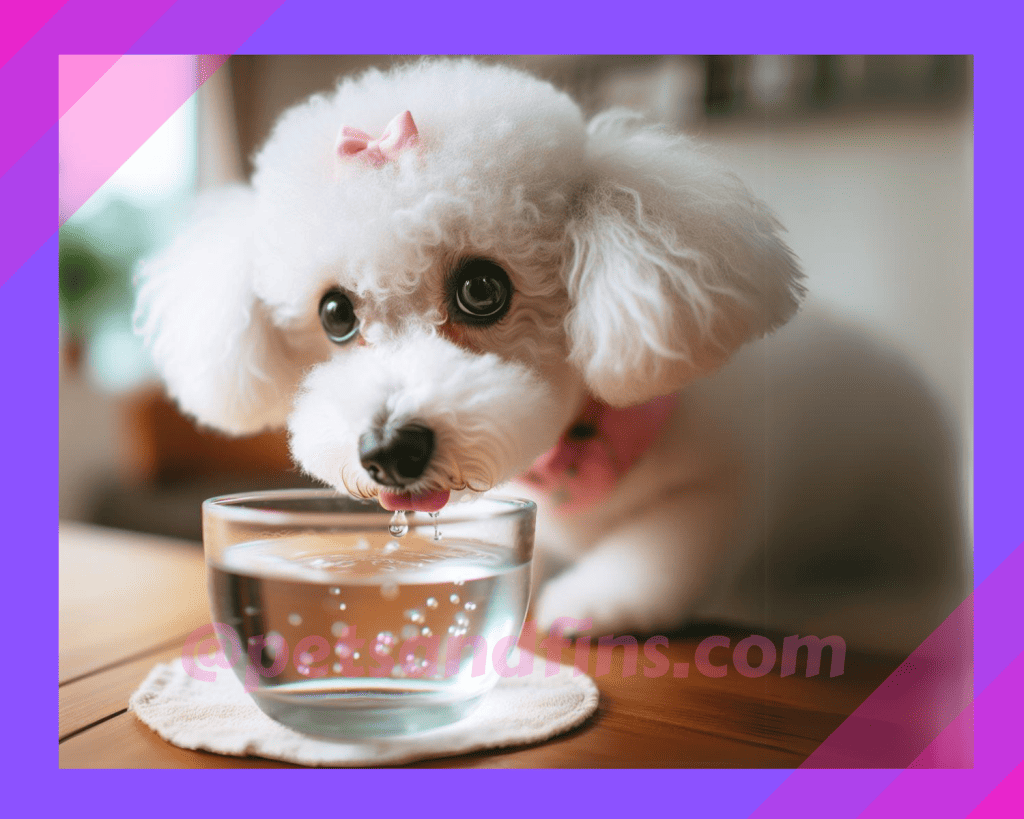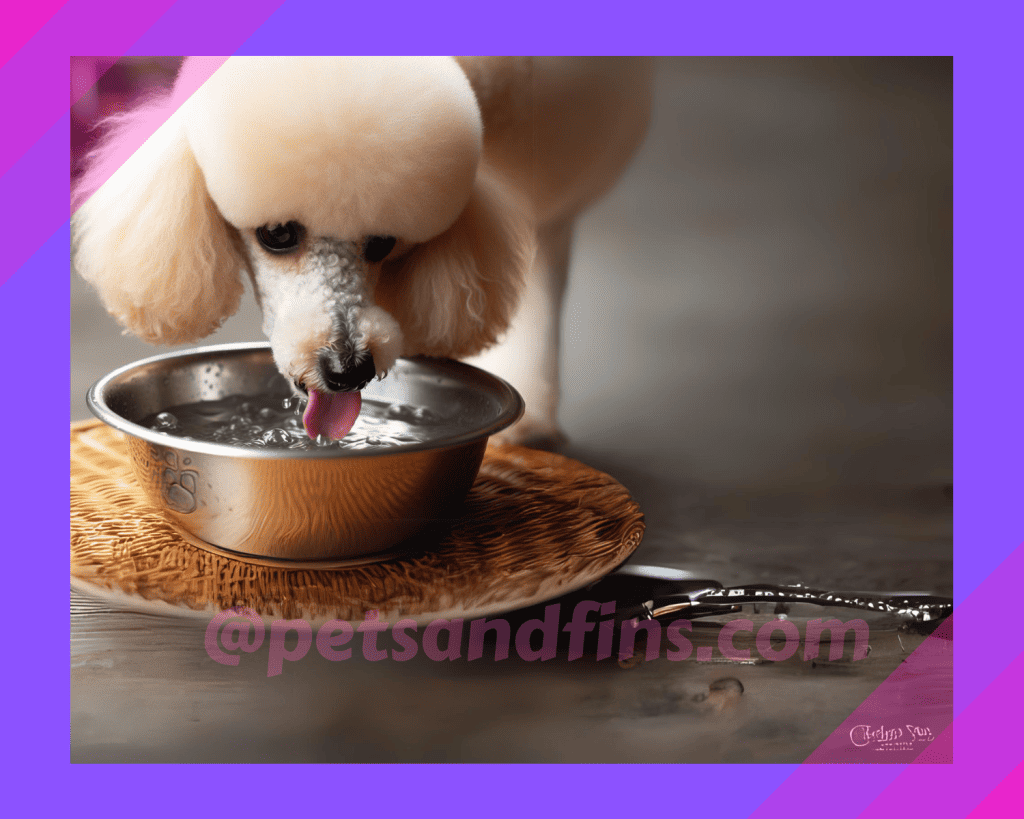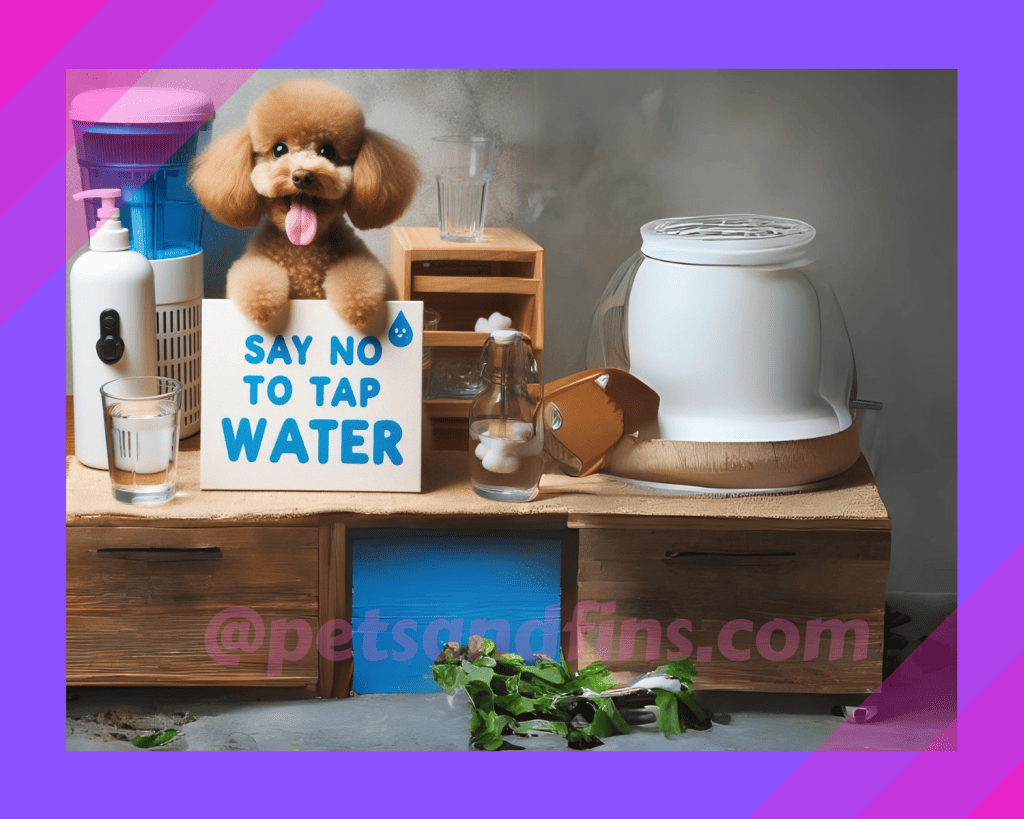In this blog post, poodles & water, we’ll explore the essential aspects of ensuring your poodle drinks the right amount of water, from understanding their size-specific needs to choosing the perfect water bowl.
Let’s dive into a topic that’s crucial for our furry friends – water. Keeping our poodles well-hydrated is not just a summer necessity; it’s a year-round commitment that directly impacts their health and happiness.
Poodles & Water (Drinking)
Size Matters: Tailoring Water Intake to Your Poodle’s Size

When it comes to our adorable poodles, size indeed plays a significant role in their hydration needs. These delightful companions come in a range of sizes, from the majestic Standard Poodle to the charming Miniature Poodle and the petite Toy Poodle.
Each size category brings its own set of water requirements, and tailoring their hydration is vital for their well-being. Picture this: while a majestic Standard Poodle might require up to 12 cups of water to quench its thirst on a scorching summer day, a dainty Toy Poodle might be content with just half a cup.
Understanding these size-specific differences is key to ensuring they stay adequately hydrated throughout the year. Let’s explore how we can cater to these unique hydration needs, keeping our beloved poodles happy and healthy.
Standard Poodle needs 6 cups of water per day and up to 12 cups in summer. A miniature poodle needs 1.5 cups with 3 cups in summer. In the case of a toy poodle, it’s 1/2 a cup of water per day and about 1 cup in summer.

Quality H2O: Why Filtered Water Matters:
Filtered water plays a pivotal role in maintaining the health and well-being of poodles for several reasons beyond the exclusion of harmful chemicals found in tap water.
Firstly, filtered water helps in the removal of potential contaminants that might not be eliminated through standard water treatment processes.
Poodles, known for their sensitive digestive systems, can be adversely affected by impurities like sediment, heavy metals, or microbes present in untreated water sources.
These impurities, even at low levels, can cause gastrointestinal distress, leading to digestive issues or even more severe health complications for these delicate pets.
Furthermore, filtered water often tastes better and lacks the chlorine or metallic taste that might deter a poodle from staying adequately hydrated.
Poodles, being discerning drinkers, might be more inclined to consume adequate amounts of water when it’s filtered and free from off-putting tastes or odors.
Moreover, filtered water typically contains a balanced pH level, which is crucial for maintaining proper hydration and overall health in poodles.
The controlled pH level ensures optimal hydration and aids in preventing urinary tract issues, which can be prevalent in this breed.
Overall, filtered water offers not just the absence of chemicals but a more palatable, purified, and healthful drinking experience, essential for the well-being of these sensitive and discerning pets.
The Perfect Bowl: Steel Bowls and Water Dispensers

The choice of bowl for your poodle’s water is more than just a container; it significantly impacts their drinking experience and overall health.
Steel bowls stand out as the optimal choice for several reasons.
Their durability ensures they withstand regular use and are easy to clean, preventing bacterial buildup. Moreover, steel doesn’t retain odors, which can be crucial for sensitive noses.
Continuous water dispensers, on the other hand, revolutionize the way water is served. These innovative gadgets maintain a consistent water level, ensuring that your poodle always has access to fresh water.
By keeping the bowl topped up, they minimize the risk of water running low, especially during your absence.
Most importantly, these dispensers often come with filters, maintaining water purity by trapping impurities and odors, and providing your poodle with crisp, clean water throughout the day.
Keeping Tabs: Monitoring Your Poodle’s Water Intake:
Paying close attention to your poodle’s water intake is vital for their overall health and well-being. The signs indicating a healthy water intake are relatively straightforward.
Typically, a well-hydrated poodle exhibits a balance in their behavior and physical condition. They’ll often have a good energy level, a healthy coat, and pink gums. Their skin elasticity remains intact, and they urinate regularly, showing neither excessive nor too little frequency.
However, if you notice any sudden changes in their water consumption, it’s crucial to investigate further.
An increase in drinking, coupled with frequent urination or accidents indoors, might signal a problem.
Conversely, a decrease in water intake could be a cause for concern. Signs of dehydration may include lethargy, dry or sticky gums, sunken eyes, loss of skin elasticity, or a dry and dull coat.
When irregularities arise in your poodle’s water intake, it’s time to take action. Start by assessing potential environmental factors.
Is their water bowl clean and accessible? Has there been a change in their surroundings or routine? Sometimes, stress or a new environment can temporarily affect their drinking habits.
However, if these changes persist or are accompanied by concerning symptoms, consulting your vet becomes crucial. They can conduct a thorough examination to identify any underlying health issues and recommend the necessary steps to restore your poodle’s hydration and overall well-being.
The Cool Factor: Serving Refreshing Water:

Ensuring our poodles have access to cool, fresh water is more than just a comfort – it’s a vital necessity. Picture a scorching summer day; while we reach for an ice-cold drink to quench our thirst, our poodles have similar needs.
Serving cool water to our furry companions isn’t just about luxury; it’s crucial for their well-being. When the sun beats down, their hydration needs increase and cool water becomes a lifeline.
It aids in regulating their body temperature, preventing overheating and dehydration. As caring pet owners, we need to explore various sources of water that offer the perfect balance of freshness and cleanliness.
Bottled water and filtered or purified water are excellent options, ensuring that every sip our poodle takes is refreshing and free from impurities.
This attention to their hydration guarantees they receive the best possible care and contributes to their overall satisfaction and health.
Warning Signs: When to Consult the Vet:
Changes in your poodle’s water intake can be an essential clue to their health. If your furry friend is suddenly drinking a lot more water than usual, it might signal a potential issue such as diabetes, kidney problems, or even Cushing’s disease.
Conversely, if your poodle is drinking noticeably less water, it could be a red flag for dehydration, urinary tract infections, or other health concerns.
Recognizing these changes and understanding their significance is crucial. If you notice any irregularities in your poodle’s water consumption habits, it’s time to consider a vet visit.
It’s our responsibility as pet parents to pay attention to these subtle cues because our poodles rely on us to advocate for their health. Keeping a keen eye on their hydration is one of the simplest yet most vital ways to ensure their well-being.
Quality Over Quantity: Say No to Tap Water:

Choosing filtered water for your poodle is an essential step toward maintaining their long-term health and vitality. Tap water often contains various chemicals and contaminants like fluoride, chromium, and Perchlorate, which can pose serious health risks to your furry friend.
Fluoride, commonly added to water supplies, can lead to dental problems and potentially impact bone health, especially when consumed regularly.
Chromium, another prevalent contaminant, has been linked to gastrointestinal issues, affecting digestion and overall well-being.
Additionally, Perchlorate, found in some water sources, can interfere with thyroid function, potentially causing hormonal imbalances and related health complications.
Given these concerns, providing filtered water free from such harmful elements becomes more than just a preference—it’s a crucial necessity in ensuring your poodle’s optimal health and safeguarding them from potential health risks associated with regular tap water consumption.
Conclusion:
In summary, maintaining proper hydration for your beloved poodle goes beyond just providing water. It’s a comprehensive dedication that revolves around comprehending their individual requirements, offering the best water source possible, and vigilantly overseeing their water consumption.
By embracing this commitment, we’re actively safeguarding their overall health and vitality. Let’s place hydration at the forefront of their care regimen, ensuring our poodles are joyously content, in optimal health, and abundantly hydrated, enabling them to thrive each day. Here’s to our furry friends living their best lives, filled with happiness, health, and ample hydration!

